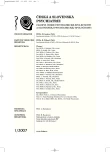-
Medical journals
- Career
Neurobiology of ADHD
Authors: O. Šerý; R. Štaif; Didden W.l
Authors‘ workplace: Laboratoř neurobiologie a molekulární psychiatrie, Ústav biochemie, Přírodovědecká fakulta MU, Brno vedoucí ústavu prof. RNDr. V. Mikeš, CSc. GHC Research Institute, Houston, TX, USA ; ředitel ústavu prof. W. Didden, M. D., Ph. D. 1
Published in: Čes. a slov. Psychiat., 103, 2007, No. 1, pp. 28-46.
Category: Comprehensive Reports
Overview
Attention-deficit hyperactivity disorder (ADHD) belongs to common causes of psychiatric treatment in childhood. Risk factors of the pathogenesis are not only genetic factors, but also non-genetic ones such as low weight at birth, perinatal hypoxia and influence of toxic substances during the prenatal period. The causes of the disorder have been thoroughly investigated using the neuroimaging and molecular biology methods in the past ten years. It was found that biological parents and relatives with ADHD have much higher percentage of ADHD symptoms in their offsprings. Obviously, the results of twin studies have brought the evidence of the disorder’s heritability. During the past few years many molecular-biology studies have appeared, which are focused on the research of influence of so-called candidate genes in the pathogenesis of ADHD. Our review summarises the results of these studies.
Key words:
ADHD, hyperkinetic disorder, association study, polymorphism, gene, DRD2, DRD4, COMT, DBH, DAT1, NET1, MAO, IL-6
Labels
Addictology Paediatric psychiatry Psychiatry
Article was published inCzech and Slovak Psychiatry

2007 Issue 1-
All articles in this issue
- Slovak Adaptation of CORE-OM (Clinical Outcomes in Routine Evaluation – Outcome Measure)
- Changes in Cognitive Functions during One Year after Onset of Schizophrenia
- Current View on the Suicide Risk during Treatment of Antidepressants in Children
- Neurobiology of ADHD
- Psychic Symptoms of Multiple Sclerosis
- Czech and Slovak Psychiatry
- Journal archive
- Current issue
- Online only
- About the journal
Most read in this issue- Slovak Adaptation of CORE-OM (Clinical Outcomes in Routine Evaluation – Outcome Measure)
- Psychic Symptoms of Multiple Sclerosis
- Current View on the Suicide Risk during Treatment of Antidepressants in Children
- Neurobiology of ADHD
Login#ADS_BOTTOM_SCRIPTS#Forgotten passwordEnter the email address that you registered with. We will send you instructions on how to set a new password.
- Career

